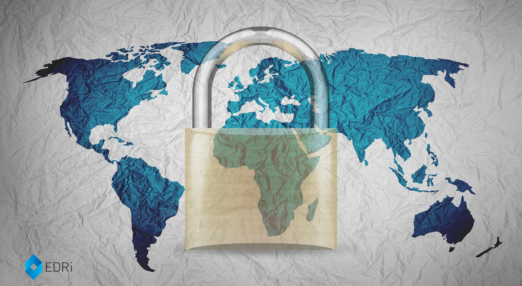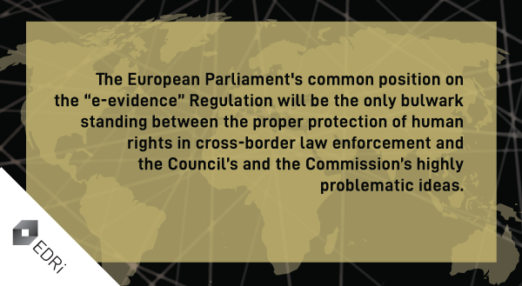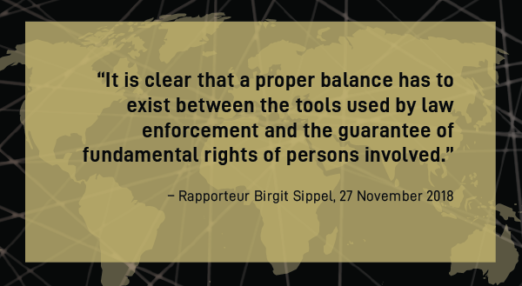e-evidence
Filter by...
-

Germany: Invading refugees’ phones – security or population control?
In its new study, EDRi member Society for Civil Rights (GFF) examines how German authorities sniff out refugees’ phones. The aim of “data carrier evaluation” is supposed to be determining a person’s identity and their country of origin. However, in reality, it violates refugees’ rights and does not produce any meaningful results.
Read more
-

Accountable Migration Tech: Transparency, governance and oversight
Migration continues to dominate headlines around the world. For example, given the currently deteriorating situation at the border between Greece and Turkey, with reports of increasingly repressive measures to turn people away, new technologies already play a part in border surveillance and decision-making at the border.
Read more
-

E-evidence and human rights: The Parliament is not quite there yet
The European Parliament Committee on Civil Liberties (LIBE) is currently busy working out a compromise between its different political groups in order to establish a common position on the “e-evidence” Regulation.
Read more
-

Click here to allow notifications in cross-border access to data
From a fundamental rights perspective, it’s essential that the proposal enabling cross-border access to data for criminal proceedings (“e-evidence”) includes a notification mechanism. However, this requirement of a notification seems to be out of the question for those advocating for “efficiency” of cross-border criminal investigations, even if that means abandoning the most basic procedural safeguards […]
Read more
-

Double legality check in e-evidence: Bye bye “direct data requests”
After having tabled some 600 additional amendments, members of the European Parliament Committee on Civil Liberties (LIBE) are still discussing the conditions under which law enforcement authorities in the EU should access data for their criminal investigations in cross-border cases. One of the key areas of debate is the involvement of a second authority in […]
Read more
-

Casual attitude in intelligence sharing is troubling
A recent report by Dutch Military Intelligence and Security Service CTIVD shows that the Dutch secret services regularly violate the law when sharing intelligence with foreign services. For the sake of privacy and freedom of communication, it is crucial that data sharing safeguards are both tightened and more strictly enforced.
Read more
-

Dance. Enjoy. Share. With Care.
Anyone using cloud services should be aware of what the “cloud” is, what it is not, and how it can affect our privacy and security. Our information stored in “clouds” can be protected if the EU says “Yes!” to a strong ePrivacy Regulation, greater enforcement of the General Data Protection Regulation (GDPR), and drops the […]
Read more
-

“E-evidence”: Repairing the unrepairable
On 11 November 2019, Member of the European Parliament (MEP) Birgit Sippel (S&D), Rapporteur for the Committee on Civil Liberties, Justice and Home Affairs (LIBE) presented her draft Report, attempting to fix the many flaws of the European Commission’s “e-evidence” proposal. Has Sippel MEP been successful at repairing the unrepairable? The initial e-evidence proposal by […]
Read more
-

EU rushes into e-evidence negotiations without common position
On 6 June 2019, the Justice and Home Affairs Council (JHA) – which gathers all EU Member States Ministers of Justice – asked the European Commission to start international negotiations on cross-border access to electronic evidence in criminal matters (so-called “e-evidence”) in the upcoming months. The Commission should enter into bilateral negotiations with the United […]
Read more
-

Cross-border access to data for law enforcement: Document pool
The European Commission proposed a Regulation on cross-border access to and preservation of electronic data held by service providers and a Directive to require service providers to appoint a legal representative within the EU in April 2018. Since then, the legislative process to adopt them has been fast-tracked, which has prevented any proper assessment of […]
Read more
-

LIBE Committee analysis: Challenges of cross-border access to data
On 7 February, the European Parliament Committee on Civil Liberties, Justice and Home Affairs (LIBE) presented two new working documents analysing further the issue of cross-border access to data in criminal matters, also known as “e-evidence”.
Read more
-

EU Council’s general approach on “e-evidence”: From bad to worse
On 7 December 2018, the Justice and Home Affairs Council (JHA) adopted its general approach – a political agreement before entering into negotiations with the European Parliament – on the proposal for a Regulation on European Production and Preservation Orders in criminal matters. The initial proposals of the European Commission already raised concerns in terms […]
Read more
